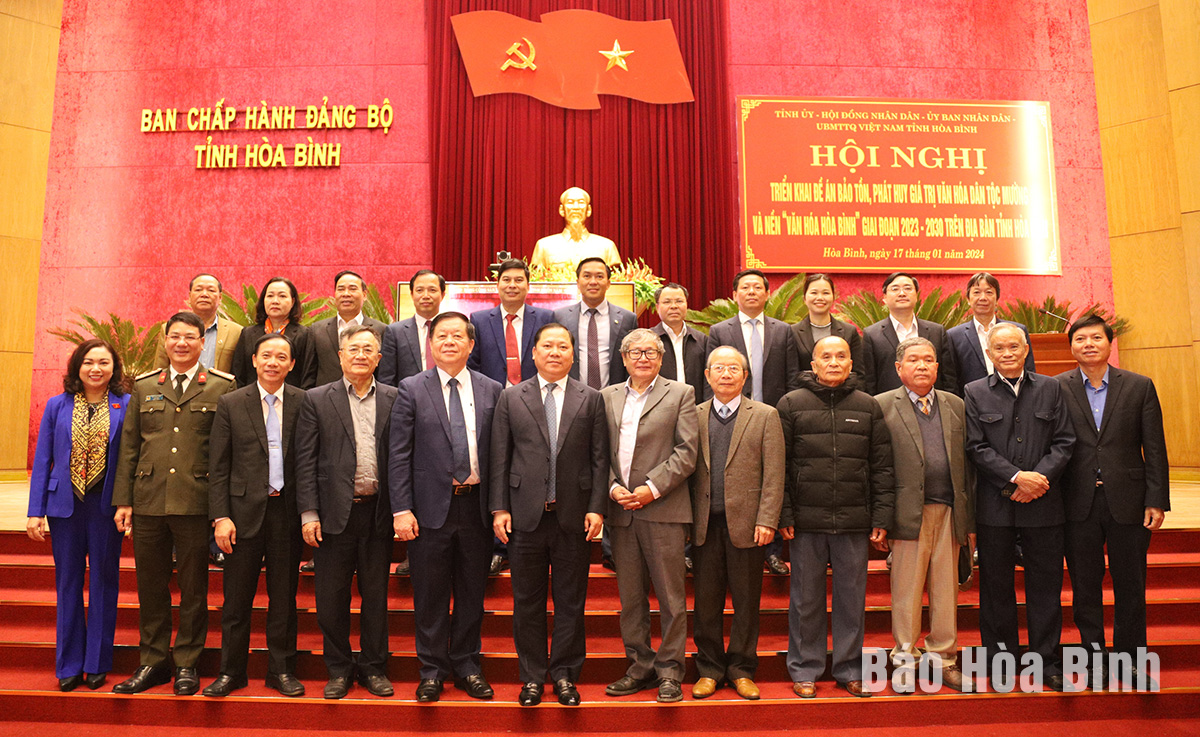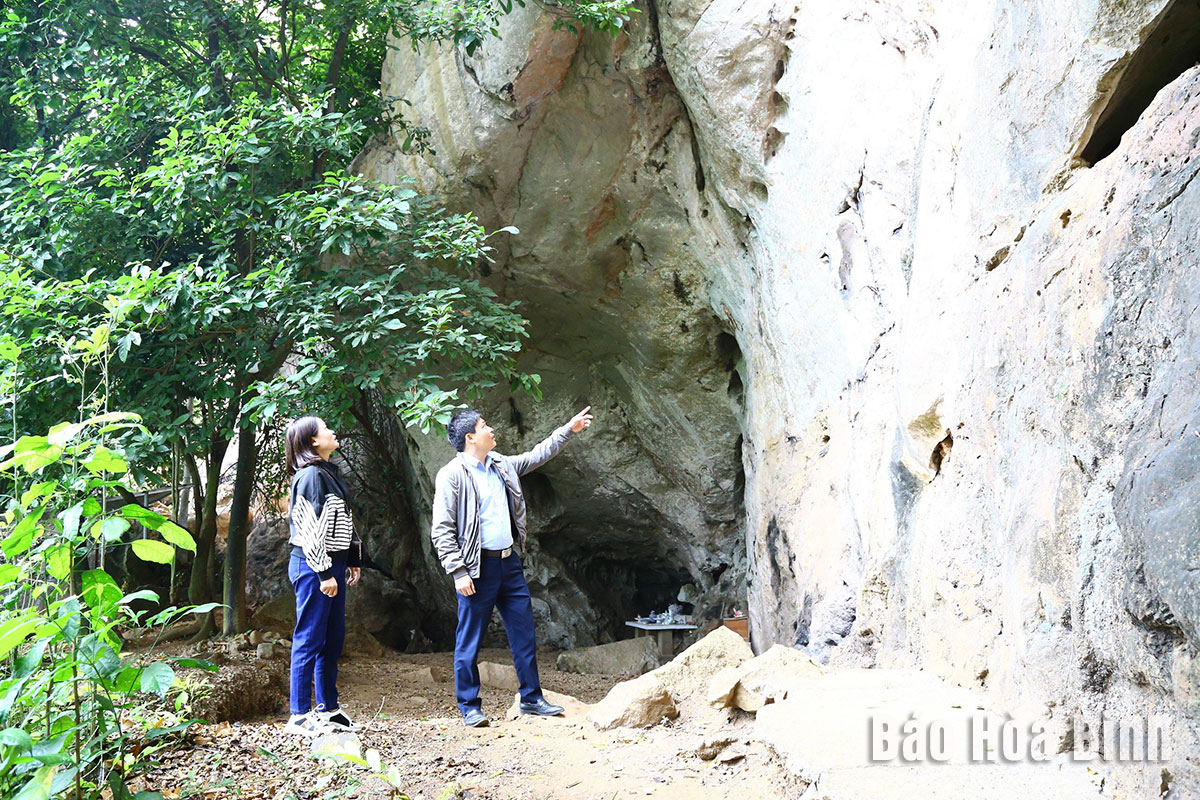
The project on preserving and promoting cultural values of the Muong ethnic group and the Hoa Binh civilisation for 2023-2030 in Hoa Binh province has been approved, helping promote and popularise the region and the people of Hoa Binh while developing unique tourism products to attract domestic and international tourists, contributing to the province's socio-economic development in the near future.

Nguyen Trong Nghia, Secretary of the Party Central Committee, head of the Party Central Committee's Communications and Education Commission, and other leaders and delegates attending the conference to deploy the project on preserving and promoting the cultural values of the Muong ethnic group and the "Hoa Binh civilisation” in the 2023 - 2030 period in Hoa Binh province.

Officials of the People's Committee of Yen Phu commune (Lac Son) visit the Lang Vanh Stone Roof relic - a place with many relics of "Hoa Binh civilisation".
The Muong ethnic people make up more than 63% of Hoa Binh’s
population. Over the years, the province has placed a special emphasis on
preserving and promoting the cultural values of the group’s unique cultural
values.
The Khai ha festival of the Muong ethnic group in Hoa Binh, the
biggest and oldest traditional folk event indispensable to the community on the
occasion of the lunar new year, was held in early 2023, marking a highlight in
the province's cultural events this year. In 2022, the festival was recognised
as a national intangible cultural heritage by the Ministry of Culture, Sports,
and Tourism.
Regarding intangible cultural heritage, numerous Muong cultural
relics have been discovered within the province, such asthe ancient tomb
clusters in Dong Thech, Kim Truy (Kim Boi), Lo hamlet (now Muong Lo hamlet),
Luy hamlet (now Luy Ai hamlet), and Dong Bay (Tan Lac).
The value of the Muong ethnic traditional stilt houses and
clothing has also garnered increasing attention in recent times. Muong gong
art, featured prominently in the province's festivals, has been extensively
invested in and expanded. In 2016, the art was included in the list of national
intangible cultural heritage.
Additionally, the inventory of intangible cultural heritage for
the purposes of preservation and promotion has been a focus. As a result, 267
Muong heritages of this kind have been documented.
Muong ethnic cultural values are invaluable assets that unite
the Vietnamese ethnic community. The Muong people in Hoa Binh province have
created unique cultural values from customs, practices, beliefs, cuisine, folk
songs, proverbs, festivals, folk knowledge and Mo Muong (a type of folk rite
practiced at funerals or rituals). Meanwhile, the "Hoa Binh civilisation” had
an important position during the Stone Age in Vietnam, as well as the world. It
is also an extremely valuable asset to humanity.
Outstanding artisan, cultural researcher Bui Huy Vong in Huong Nhuong commune,
Lac Son district, said that over the past time, attention has been paid to the
preservation and promotion of the values of the Muong cultural heritage. Many
typical intangible cultural heritages of the Muong ethnic group have been
recognised as national heritages such as Mo Muong Hoa Binh, Muong gong art, and
Khai ha festival.
Nhuong emphsised that the most common typical values of the
Muong national cultural heritage are to uphold the spirit of patriotism, love,
solidarity, national unity, and cohesion of clans and communities, and family
values, among others.
To preserve and promote the cultural values of the Muong ethnic group and the
"Hoa Binh civilisation", provincial authorities have supported
artisans to participate in the work and encouraged scientists to study them.
Nguyen Van Viet, Director of the Centre for Prehistory of
Southeast Asia, stressed the meaning of human heritage of the Hoa Binh
civilisation. The province has affirmed its role as the host by hosting many
conferences and organising reconnaissance, excavation and scientific
seminars.
Especially, in 2017, Hoa Binh successfully hosted the
celebration of the 85th anniversary of the world recognition of the "Hoa
Binh civilisation" and the 90th anniversary of the province’s
establishment in 2022. The province needs to promote cultural values associated
with tourism development, bringing income to people and contributing to the
budget.
According to experts, the province needs to focus on restoring typical
traditional festivals and folk games in association with developing unique and
attractive tourism products as well as promoting unique traditional festivals,
traditional costumes, houses on stilts, folk songs, Muong gongs, Mo Muong, and
beautiful customs of the Muong ethnic group in Hoa Binh. Muong people’s
language has been taught at several schools in the province.
The concerted solutions are expected to have practical effects
in exploiting the value of the Muong ethnic cultural heritage and the "Hoa
Binh civilisation". They will contribute to arousing pride and becoming a
driving force for the socio-economic development of Hoa Binh province in the
near future, gradually transforming the economic structure, labour structure,
and occupations in rural areas, increasing income, reducing poverty sustainably
for people, especially the Muong ethnic people in highland and remote areas and
creating valuable cultural products, and serving sustainable tourism
development.
With an increasingly vibrant and widespread emulation movement aimed at building cultured residential areas and cultured families, Yen Thuy District has been making steady progress toward improving both the material and spiritual well-being of its people, while fostering a civilized, prosperous, beautiful, and progressive community.
Once lacking recreational spaces and community facilities, Residential Group 2 in Quynh Lam Ward (Hoa Binh City) has recently received attention for the construction of a new, spacious, and fully equipped cultural house. The project followed the model of state support combined with public contributions in both labor and funding.
The "All people unite to build cultural life" movement, which has been effectively integrated with Kim Boi district’s socio-economic development goals, is fostering a lively spirit of emulation across local residential areas, hamlets, villages, public agencies, and enterprises. In addition, through the initiative, traditional cultural values are being preserved and promoted, while community solidarity and mutual support in poverty reduction and economic development are being strengthened.
A working delegation of the Hoa Binh provincial People’s Committee led by its Permanent Vice Chairman Nguyen Van Toan on June 11 inspected the progress of a project to build the Mo Muong Cultural Heritage Conservation Space linked to tourism services in Hop Phong commune, Cao Phong district.
Born and growing in the heroic land of Muong Dong, Dinh Thi Kieu Dung, a resident in Bo town of Kim Boi district, in her childhood was nurtured by the sweet lullabies of her grandmother and mother. These melodies deeply imprinted on her soul, becoming an inseparable part of her love for her ethnic group's culture. For over 20 years, this love for her hometown has driven Dung to research, collect, and pass down the cultural values of the Muong people to future generations.
In the final days of May, the Ethnic Art Troupe of Hoa Binh Province organized performances to serve the people in remote, mountainous, and particularly disadvantaged areas within the province. These were not just ordinary artistic shows, but they were the meaningful journeys aimed at spreading cultural values, enhancing the spiritual life of the people and contributing to the preservation of ethnic minority cultural identities.




